human nature

Struggling to find common ground in today’s politics? In this episode, conservative scholar Yuval Levin explores how the Constitution, often blamed for political discord, actually holds the key to unity. In his new book, American Covenant, Levin blends history and analysis to reveal the Constitution’s power in fostering constructive disagreement and practical reforms. Tune in for insights on the Constitution’s genius and how it can guide us to a less divided future.
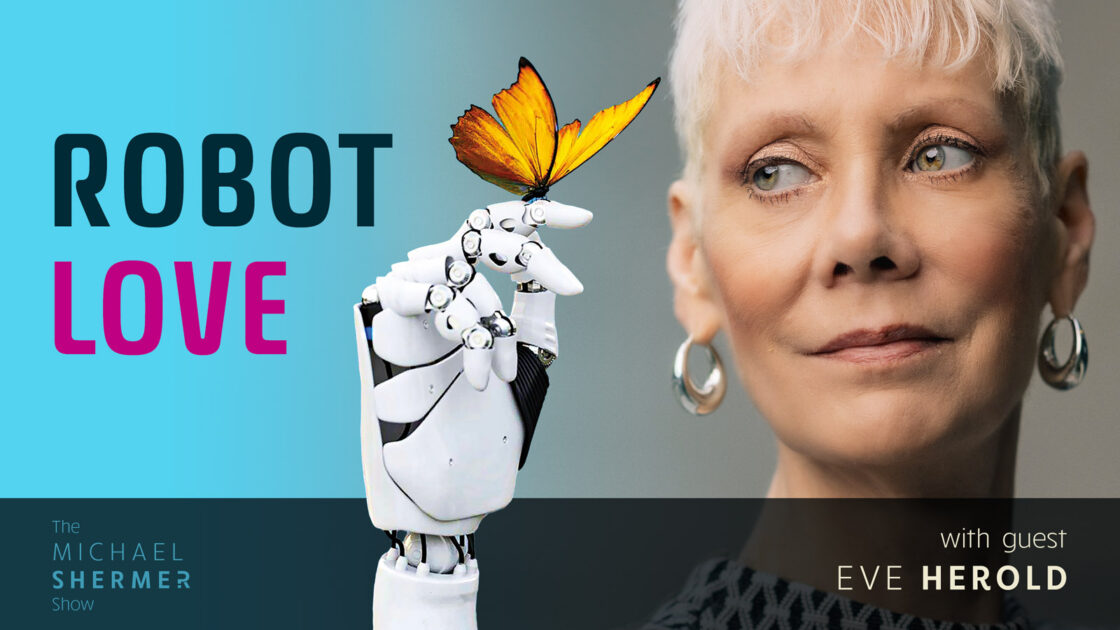
Shermer and Herold discuss: social robots, sex robots, robot nannies, robot therapists • flying cars, jetpacks and The Jetsons • Masahiro Mori • emotions, animism, mind • emotional intelligence • artificial intelligence • large language lodels • ChatGPT, GPT-4, GPT-5 and beyond • the alignment problem • robopocalypse • robo soldiers • robot sentience • autonomous vehicles • AI value systems, and their legal and ethical status.
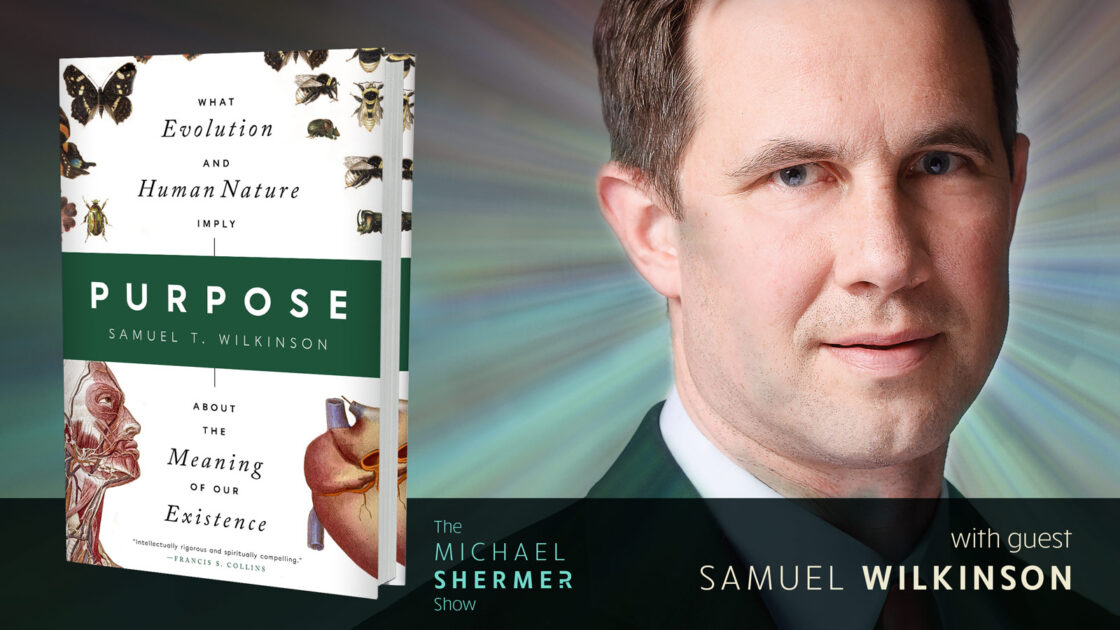
Shermer and Wilkinson discuss: • evolution: random chance or guided process? • selfishness and altruism • aggression and cooperation • inner demons and better angels • love and lust • free will and determinism • the good life and the good society • empirical truths, mythic truths, religious truths, pragmatic truths • Is there a cosmic courthouse where evil will be corrected in the next life? • theodicy and the problem of evil: Why do bad things happen to good…

Shermer and Ford discuss: • education reform • public vs. private vs. charter schools • the blank slate • Thomas Sowell’s Constrained Vision vs. Unconstrained Vision • French Revolution vs. American Revolution • truth, justice, and reality • what promotes humanity and what degrades it • transhumanism • political correctness • identity politics • cancel culture • totalitarianism • preference falsification • free speech • hate speech • how to stand up to cancel culture.
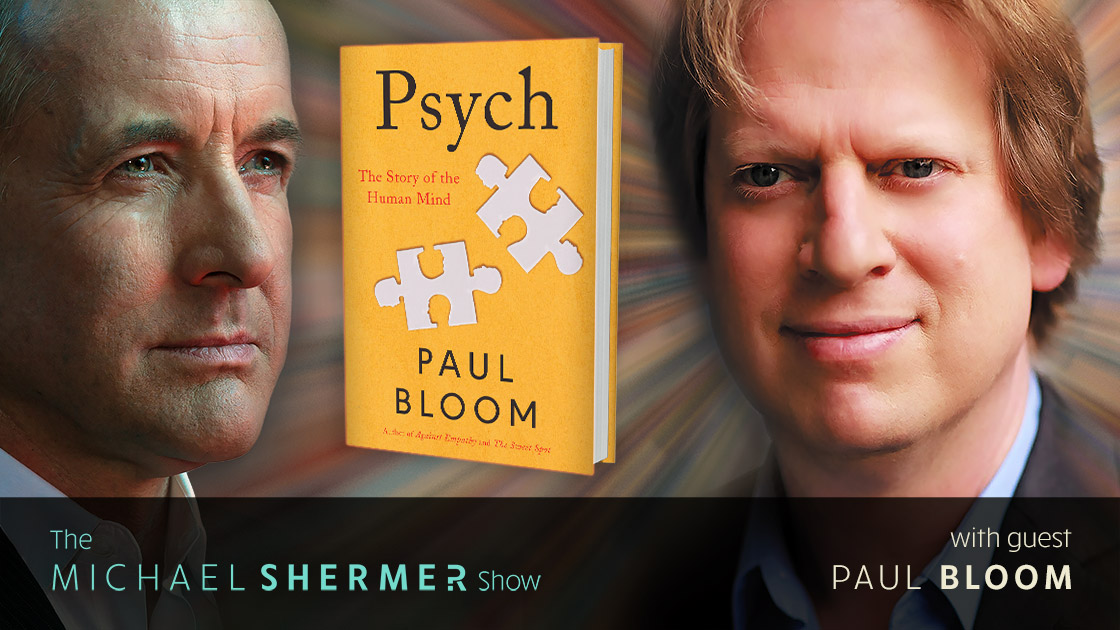
How does the brain — a three-pound gelatinous mass — give rise to intelligence and conscious experience? Was Freud right that we are all plagued by forbidden sexual desires? What is the function of emotions such as disgust, gratitude, and shame? Renowned psychologist Paul Bloom answers these questions and many more in this conversation based on his riveting new book about the science of the mind: Psych.
Michael Shermer speaks with Brian Klass about power and corruption, based on his book Corruptible: Who Gets Power and How it Changes Us. PLUS: In Memoriam: Edward O. Wilson (1929–2021) — entomologist, evolutionary theorist, and unifier of all knowledge. Read the interview from Skeptic 6.1 (1998).

In Memoriam: Edward O. Wilson (1929–2021) — entomologist, evolutionary theorist, and unifier of all knowledge. Read an extensive and intimate interview we published in Skeptic in 1998, Vol. 6, No. 1, conducted by our editor Frank Miele, upon the occasion at the time of the publication of Wilson’s game-changing book Consilience.
Jennifer Michael Hecht celebrates doubt as an engine of creativity and as an alternative to the political and intellectual dangers of certainty. This lecture from our archives was recorded in July 2005 as part of The Skeptics Society’s Distinguished Science Lecture Series.

Michael Shermer and Jordan Peterson discuss: the balance between chaos and order • Maps of Meaning • truths: objective, subjective, historical, political, religious, and literary • why all countries aren’t democracies • the appeal of populist, authoritarian leaders • the danger of assessing according to race, sex, class and power • oppression-redemption myths • how Peterson’s dark dreams and mental health issues inform his worldview as tilting toward the darker side of humanity.
In episode 174, join Michael Shermer and Jordan Peterson (bestselling author of 12 Rules for Life) for this extraordinary conversation based on Peterson’s new book Beyond Order. PLUS: Save 40% on new digital subscriptions to Skeptic Magazine via Pocketmags.com, now through April 27, 2021!
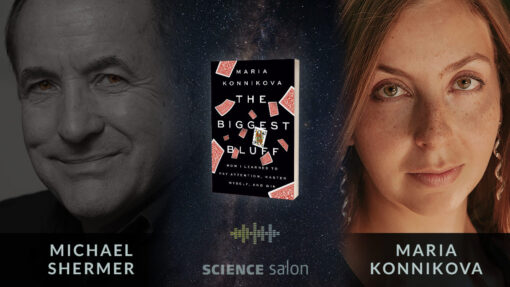
In Science Salon # 121 Michael Shermer speaks with Harvard Psychologist and high-stakes poker player Maria Konnikova about her book The Biggest Bluff: How I Learned to Pay Attention, Master Myself, and Win — the ultimate master class in learning to distinguish between what can be controlled and what can’t.
In Science Salon # 121 Michael Shermer speaks with Harvard Psychologist and high-stakes poker player Maria Konnikova about her book The Biggest Bluff: How I Learned to Pay Attention, Master Myself, and Win — the ultimate master class in learning to distinguish between what can be controlled and what can’t.
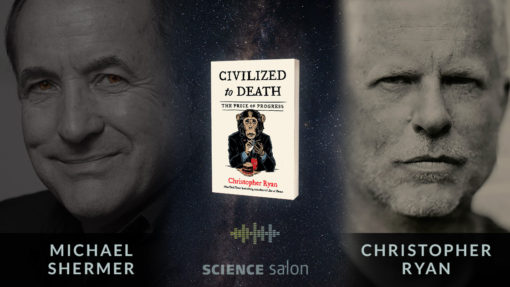
Most of us have instinctive evidence the world is ending — balmy December days, face-to-face conversation replaced with heads-to-screens zomboidism, a world at constant war, a political system in disarray. We hear some myths and lies so frequently that they feel like truths. You’re lucky to be alive here and now. Well, maybe… Civilized to Death counters the idea that progress is inherently good, arguing that the “progress” defining our age is analogous to an advancing disease.
In Science Salon # 102 Michael Shermer speaks with Christopher Ryan about his new book: Civilized to Death: The Price of Progress. PLUS, The recent spate of drone sightings in the Midwest have residents on edge. Medical sociologist Robert Bartholomew avers that one explanation can be ruled out — mass hysteria.
In Science Salon # 92 Michael Shermer speaks with Tim Samuels about his brand new book: Future Man: How to Evolve and Thrive in the Age of Trump, Mansplaining, and #MeToo. PLUS: Michael Shermer reviews The Violence Paradox, a PBS NOVA film special based on Steven Pinker’s book The Better Angels of Our Nature.
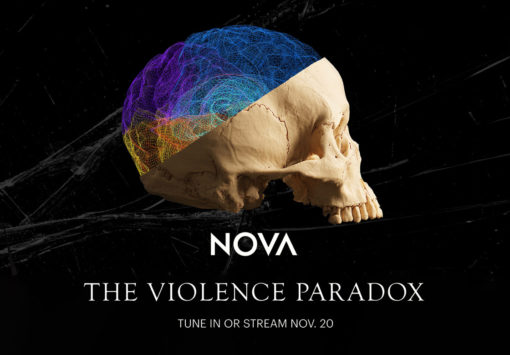
Michael Shermer reviews The Violence Paradox, a upcoming two-hour PBS NOVA film special, a production of WGBH Boston, November 20, 2019.
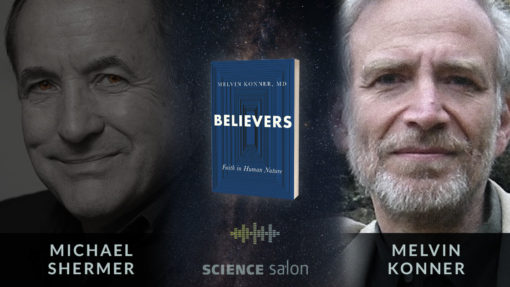
Shermer and Konner discuss: Konner’s experience living among hunter-gatherers • how hunter-gatherers conceive of religion vs. modern peoples • the “Big Gods” theory of religion • the “God Module” • why faith is not for everyone • the rise of the nones, but why religion will never completely die out • the upside of religion, and more…
In Science Salon # 90 Michael Shermer speaks with world renowned biological anthropologist Mel Konner who examines the nature of human nature, including (and especially) in his new book on the nature of religiosity. PLUS: In an article originally published in Quillette on Halloween, October 31, 2019, Dr. Shermer argues that patternicity, agenticity, pessimism, the negativity bias, and the Second Law of Thermodynamics provides a deeper explanation for why conspiracy theories are so popular and enduring. The article is based…
In Science Salon # 67, Atheist Overreach, Christian Smith explains why we ought to be skeptical of the increasingly vociferous and confident claims of atheist apologists about morality, science, and human nature; PLUS Harriet Hall, M.D. examines the dubious claims of radiation hormesis — that low levels of radiation are beneficial to health.
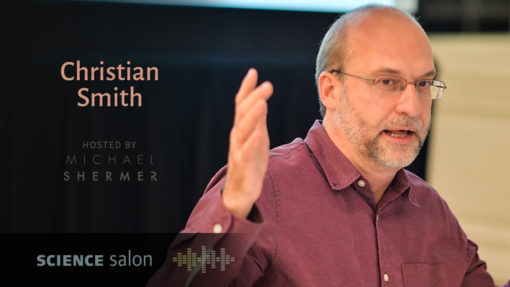
In Science Salon # 67, Atheist Overreach, Christian Smith explains why we ought to be skeptical of the increasingly vociferous and confident claims of atheist apologists about morality, science, and human nature.
NEXT →




















